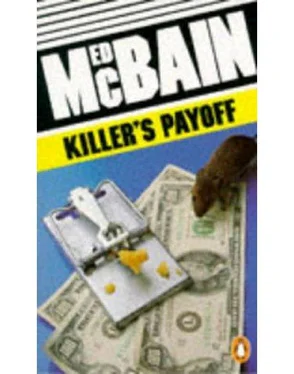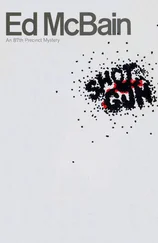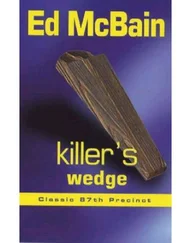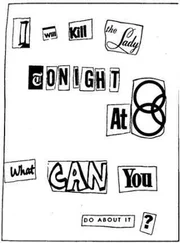McBain, Ed - Killer's Payoff
Здесь есть возможность читать онлайн «McBain, Ed - Killer's Payoff» весь текст электронной книги совершенно бесплатно (целиком полную версию без сокращений). В некоторых случаях можно слушать аудио, скачать через торрент в формате fb2 и присутствует краткое содержание. Жанр: Полицейский детектив, на английском языке. Описание произведения, (предисловие) а так же отзывы посетителей доступны на портале библиотеки ЛибКат.
- Название:Killer's Payoff
- Автор:
- Жанр:
- Год:неизвестен
- ISBN:нет данных
- Рейтинг книги:5 / 5. Голосов: 1
-
Избранное:Добавить в избранное
- Отзывы:
-
Ваша оценка:
- 100
- 1
- 2
- 3
- 4
- 5
Killer's Payoff: краткое содержание, описание и аннотация
Предлагаем к чтению аннотацию, описание, краткое содержание или предисловие (зависит от того, что написал сам автор книги «Killer's Payoff»). Если вы не нашли необходимую информацию о книге — напишите в комментариях, мы постараемся отыскать её.
Killer's Payoff — читать онлайн бесплатно полную книгу (весь текст) целиком
Ниже представлен текст книги, разбитый по страницам. Система сохранения места последней прочитанной страницы, позволяет с удобством читать онлайн бесплатно книгу «Killer's Payoff», без необходимости каждый раз заново искать на чём Вы остановились. Поставьте закладку, и сможете в любой момент перейти на страницу, на которой закончили чтение.
Интервал:
Закладка:
“All right,” she said.
“I want you to meet me tonight.”
“Why? Just give me your name, and I’ll send you the check.”
“You’ll send a policeman to pick me up, you mean.”
“No, I wouldn’t do that.”
“You’d be smart not to try anything like that. The material is with a friend of mine. If you try to call the police, if there’s even the smell of a cop with you when we meet tonight, that stuff gets mailed to the newspapers.”
“I understand. But why must we meet?”
“To get things set up.”
“You said it would be about the same as with Kramer.”
“I want to talk it over with you. I want to know just where we stand. I don’t want any mistakes.”
“All right,” Lucy said wearily. “Where shall I meet you?”
“Can you get in to the city?”
“Yes.”
“Do you know downtown Isola?”
“Yes.”
Brown picked up his pencil and moved his pad into writing position.
“There’s a place on Fieldover Street. Do you know where that is?”
“In the Quarter?”
“Yes. The place is called Gumpy’s. It’s right on Fieldover, near Marsten Square. I’ll meet you there.”
“What time?”
“Eight o’clock?”
“Yes,” Lucy said. “How will I know you?”
“I’ll be wearing a brown sharkskin suit.” The man paused. “I’ll be reading the Times. Remember, no cops. If there are any cops, the material gets mailed out before you can say Jack Robinson.”
“I’ll be there,” Lucy promised.
“Bring your checkbook,” the man said, and he hung up. The next call Lucy Mencken made was to her husband’s office. She told Charles Mencken that a college roommate of hers, a girl named Sylvia Cooke, was in town and wanted Lucy to join her for the evening. Would it be all right?
Charles Mencken was a trusting husband with a faithful wife. He told Lucy it would be perfectly all right. In fact, he would take the children to the country club for dinner. She told him she loved him, and then broke the connection.
Arthur Brown immediately called the 87th Squad.
GUMPY’S COULD JUST AS EASILY have been called Dumpy’s, because it was just that. Whoever had made the call to Lucy Mencken had shown considerable unconcern for the fact that she was a lady. The person who’d called her had even shown unconcern for the fact that she was a woman.
Gumpy’s was on Fieldover Street, close to Marsten Square. Gumpy’s catered to the trade in the Quarter. The trade did not care very much about the furniture in Gumpy’s, or the lighting, or the fact that the walls seemed ready to cave in. The trade was neither here nor there, and the trade was more or less protected by a state law that made a token show of force while actually overlooking the neither here nor there status of such people as composed the clientele of Gumpy’s. Many people from other places in the city came to ogle the steady clientele of Gumpy’s. It was good clean fun to howl at two men dancing together. It was excruciatingly comic to see a woman wearing a man’s suit and paying court to another woman. These sightseers, like the steady clientele, were too interested in what was happening around them to pay too much attention to the décor of the place. Even the fire inspector didn’t care very much. It was rumored about that Gumpy himself paid a considerable chunk each month to keep the place from being condemned as a fire trap. Such rumors always run rife when a man has a profitable enterprise going for him. Why, the fire inspector may have been the most honest man in the city, and far above taking any sort of bribe.
The detective who went to Gumpy’s in a sports shirt and slacks on the night of July thirteenth was a man who had no connection with the Kramer case at all. In debating who should make the collar, Carella and Hawes weighed in the fact that Hawes had been tailed not two nights before. It was possible, just possible, that the tail would turn out to be the person who had the assignation with Lucy Mencken. And if Hawes had been tailed, was it not likely that other members of the squad had likewise been tailed and could likewise be recognized? They did not want to lose a collar by being spotted for bulls. They chose a man who’d done no legwork on the Kramer case, a man in fact who’d just polished off a burglary and who was waiting for action.
The man’s name was Bob O’Brien. He was a Detective 2nd/Grade. He was Irish clear down to his belly button. Some of the bulls held that the only reason he’d joined the force was so that he’d be able to march in the St. Paddy’s Day parade down Hall Avenue. Actually, O’Brien had joined the force quite by accident. He’d applied for positions as postal clerk, fireman, and cop; he’d passed all three examinations. By pure chance, the police department had called him first, and he’d taken the job.
O’Brien was six feet one inch tall and he weighed two hundred and ten pounds. When you got hit by O’Brien, you sometimes suffered a fractured jaw. The hamhock-hands cliché had been invented to apply to the Irish mitts of Bob O’Brien. He’d been raised in Hades Hole, and had learned the art of street fighting (as opposed to the art of boxing) before he’d cut his second teeth. In those days, O’Brien had been on the opposite side of the law. When you saw a cop coming, you ran like hell. Now, and fortunately for the city, he was on the right side of the fence, using his fists for law enforcement, using his 20/20 vision and his .38 Police Special to excellent advantage.
Bob O’Brien had killed seven men in the line of duty.
He was not a trigger-happy cop. He never used his gun unless he had to. But there are cops who get the dirty end of the stick, cops who are forced to use their gun, and Bob O’Brien was one of those cops. He had killed his first man when he was still a rookie, and the first man he’d killed was a man he’d known. He had still been living in Hades Hole at the time. It was a Saturday morning in mid-August, and O’Brien was off-duty and wearing a pair of swimming trunks under his slacks and sports shirt. He was supposed to meet a few of the fellows on his front stoop. From there the boys would go to the beach. He was, of course, carrying a gun in his right hip pocket. The street was quiet with the hush of a hot summer. O’Brien loafed on the front stoop, waiting for the boys. It was then that Eddie the Butcher came out of his shop with the meat cleaver.
Eddie was chasing a woman. On his face was the crazed look of a man who has lost all touch with his surroundings. O’Brien came off the stoop as the woman rushed by. He stepped directly into Eddie’s path. He had no intention of shooting Eddie.
“What’s the matter, Eddie?” he said gently.
Eddie raised the meat cleaver over his head. “Get out of my way!” he shouted.
“This is Bobby,” O’Brien said. “Now put away that—”
Eddie lunged forward, knocking O’Brien flat to the pavement. With one hand holding O’Brien’s throat, he raised his other hand over his head, and the cutting edge of the meat cleaver gleamed in the morning sunlight. O’Brien twisted onto one hip. The crazed expression was still on Eddie’s face. The meat cleaver was poised above O’Brien’s head. And then it began its shimmering descent. O’Brien, acting reflexively, drew his revolver, and fired. The cleaver dropped from Eddie’s hand, six inches from O’Brien’s face. Eddie rolled over onto the scorching pavement—dead.
That night Bob O’Brien cried like a baby.
And since that time death had hung around his neck like an albatross. Since that time he had been forced to kill six more men in the line of duty. He did not know any of these men, but that was the only difference between them and Eddie the Butcher. Whenever he was forced to kill, Bob O’Brien still wept. Not openly. He wept inside, and that is where it hurts most.
Читать дальшеИнтервал:
Закладка:
Похожие книги на «Killer's Payoff»
Представляем Вашему вниманию похожие книги на «Killer's Payoff» списком для выбора. Мы отобрали схожую по названию и смыслу литературу в надежде предоставить читателям больше вариантов отыскать новые, интересные, ещё непрочитанные произведения.
Обсуждение, отзывы о книге «Killer's Payoff» и просто собственные мнения читателей. Оставьте ваши комментарии, напишите, что Вы думаете о произведении, его смысле или главных героях. Укажите что конкретно понравилось, а что нет, и почему Вы так считаете.












